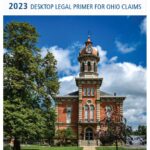Posted on
July 18, 2023
in
Business,
News

Under the Perishable Agricultural Commodities Act (“PACA”) there are very specific protections for growers and sellers of produce. In particular, PACA specifies the need for prompt payment terms which means payment in full within 10 days of the buyer’s acceptance of the produce. See, 7 C.F.R. §46.2(aa). The payment terms between the parties can never […]
Posted on
June 20, 2023
in
Automotive/Transportation,
News

First, these are ideas I have formed after reviewing a lot of information on EV batteries. You have to educate yourself and perform additional research. Further, it is imperative that you consult with your insurance company for appropriate coverage and guidance. Automobile dealerships are and will be required to store EV batteries on their premises whether […]
Posted on
May 26, 2023
in
Insurance,
News

Congratulations to Weston Hurd’s John Farnan and Dan Richards. In a May 24, 2023 opinion, in Lamorak Insurance Co. v. Goodrich Corporation, the Summit County Court of Common Pleas ordered that their client, an insurance carrier, did not owe an additional $110 million of insurance coverage to Goodrich for an environmental loss claim. The matter involved […]

I know how to read a Buyer’s Order and reconcile the math. My office consistently receives new consumer lawsuits alleging issues with the sales transaction, pricing of the vehicles, and advertising. At times when reviewing the sales contract, we have to dig hard to figure out how the sales price was derived. This can be […]
Posted on
April 12, 2023
in
Education,
Labor,
News

Set yourself up for a positive bargaining experience by understanding the negotiations landscape as we continue to navigate the post-pandemic era. “While some aspects of bargaining remain constant, 2023 certainly has some unique challenges in store,” according to the authors – Weston Hurd partners Megan E. Greulich and Eric J. Johnson, “From COVID-19 exhaustion to […]
Posted on
March 30, 2023
in
Business,
News

As springtime approaches and the growing season kicks off, conducting a bit of housekeeping now can be indispensable in protecting your business down the road. Factors to consider include: All PACA license information should be up-to-date. This will only take minutes but can prevent a plethora of problems. All invoices should contain the exact statutory […]
Posted on
March 7, 2023
in
Insurance,
News,
Publications

Weston Hurd’s 2023 – Desktop Legal Primer for Ohio Claims serves as a comprehensive go-to-guide and useful reference tool. Researched and written by Weston Hurd attorneys, the Primer contains Ohio statutes, case citations, and covers topics involving: Claim Limitation Periods – Statutes of Limitation; Product Liability Statute of Repose; Construction Statute of Repose; Legal Malpractice Statute of Repose; […]
Posted on
January 31, 2023
in
Business,
News

On January 3, 2023, Ohio Governor Mike DeWine signed Senate Bill 288 into law. This 500-page bill makes sweeping changes to numerous aspects of criminal law and the justice system. The bill also creates some new criminal offenses that did not previously exist in Ohio. The new laws take effect in April. One part of […]





